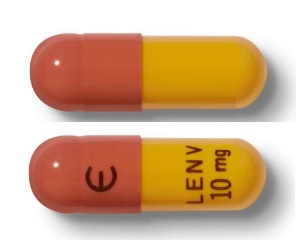Lenvatinib Interactions
There are 321 drugs known to interact with lenvatinib, along with 14 disease interactions, and 1 alcohol/food interaction. Of the total drug interactions, 71 are major, 248 are moderate, and 2 are minor.
- View all 321 medications that may interact with lenvatinib
- View lenvatinib alcohol/food interactions (1)
- View lenvatinib disease interactions (14)
Most frequently checked interactions
View interaction reports for lenvatinib and the medicines listed below.
- Acetylsalicylic Acid (aspirin)
- Activated Charcoal (charcoal)
- Allegra (fexofenadine)
- Asmanex Twisthaler (mometasone)
- Benadryl (diphenhydramine)
- Claritin (loratadine)
- Compazine (prochlorperazine)
- Cymbalta (duloxetine)
- Eliquis (apixaban)
- Keytruda (pembrolizumab)
- L-Arginine (arginine)
- L-Carnitine (levocarnitine)
- L-Cysteine (cysteine)
- Lasix (furosemide)
- Lithium Carbonate ER (lithium)
- Metoprolol Tartrate (metoprolol)
- MiraLAX (polyethylene glycol 3350)
- Narcan (naloxone)
- Protonix (pantoprazole)
- Synthroid (levothyroxine)
- Tylenol (acetaminophen)
- Valproate Sodium (valproic acid)
- Vitamin B1 (thiamine)
- Vitamin B12 (cyanocobalamin)
- Vitamin B6 (pyridoxine)
- Vitamin D3 (cholecalciferol)
- Vitamin K (phytonadione)
- Vitamin K2 (menaquinone)
- Xarelto (rivaroxaban)
- Zofran (ondansetron)
Lenvatinib alcohol/food interactions
There is 1 alcohol/food interaction with lenvatinib.
Lenvatinib disease interactions
There are 14 disease interactions with lenvatinib which include:
- arterial thromboembolism
- bleeding
- cardiac dysfunction
- diarrhea
- GI perforation
- hepatic impairment
- hypertension
- hypocalcemia
- hypothyroidism
- proteinuria
- QT prolongation
- renal impairment
- RPL syndrome
- lung toxicity
More about lenvatinib
- lenvatinib consumer information
- Compare alternatives
- Reviews (6)
- Side effects
- Dosage information
- During pregnancy
- Drug class: multikinase inhibitors
- Breastfeeding
- En español
Related treatment guides
Drug Interaction Classification
| Highly clinically significant. Avoid combinations; the risk of the interaction outweighs the benefit. | |
| Moderately clinically significant. Usually avoid combinations; use it only under special circumstances. | |
| Minimally clinically significant. Minimize risk; assess risk and consider an alternative drug, take steps to circumvent the interaction risk and/or institute a monitoring plan. | |
| No interaction information available. |
See also:
Further information
Always consult your healthcare provider to ensure the information displayed on this page applies to your personal circumstances.


